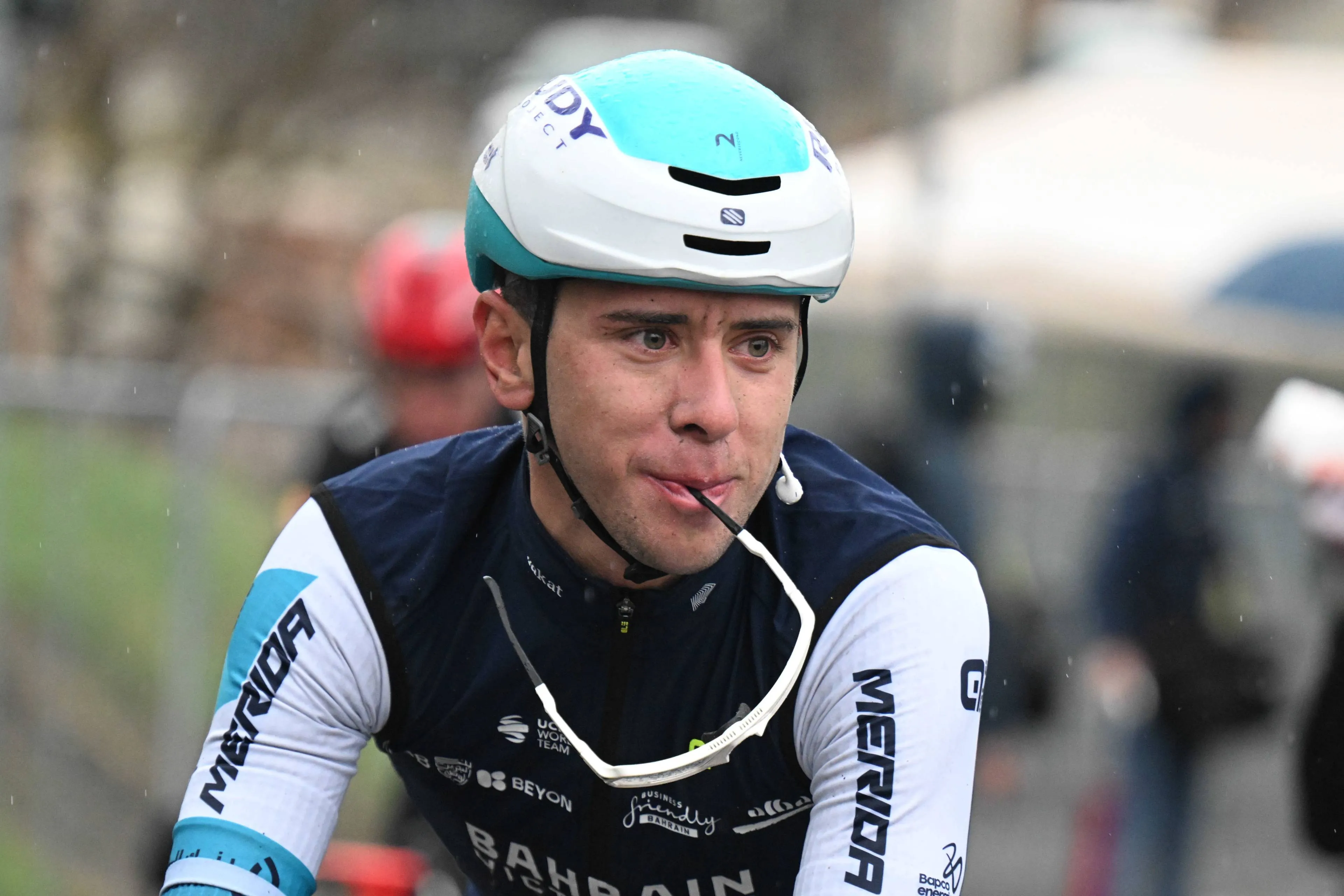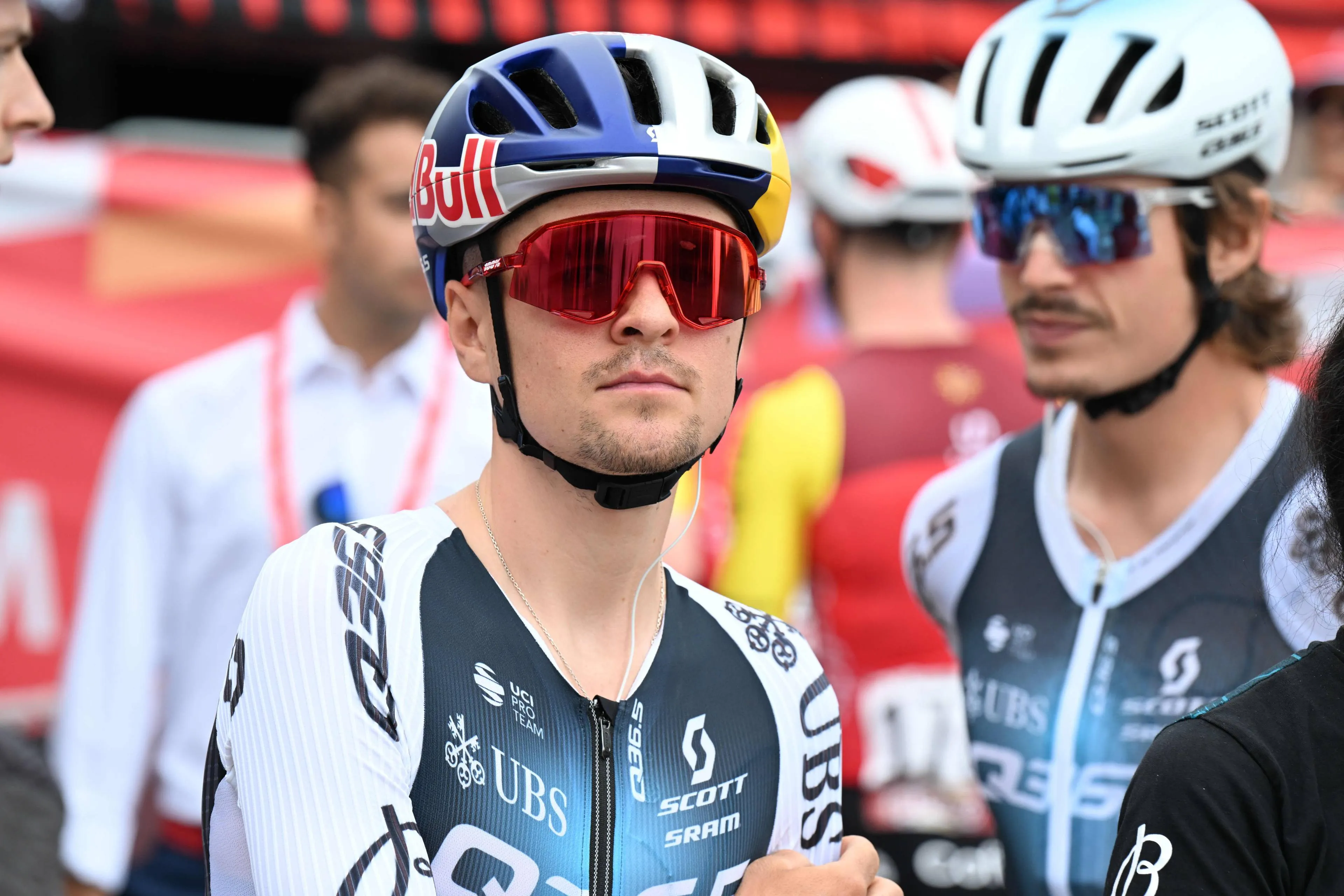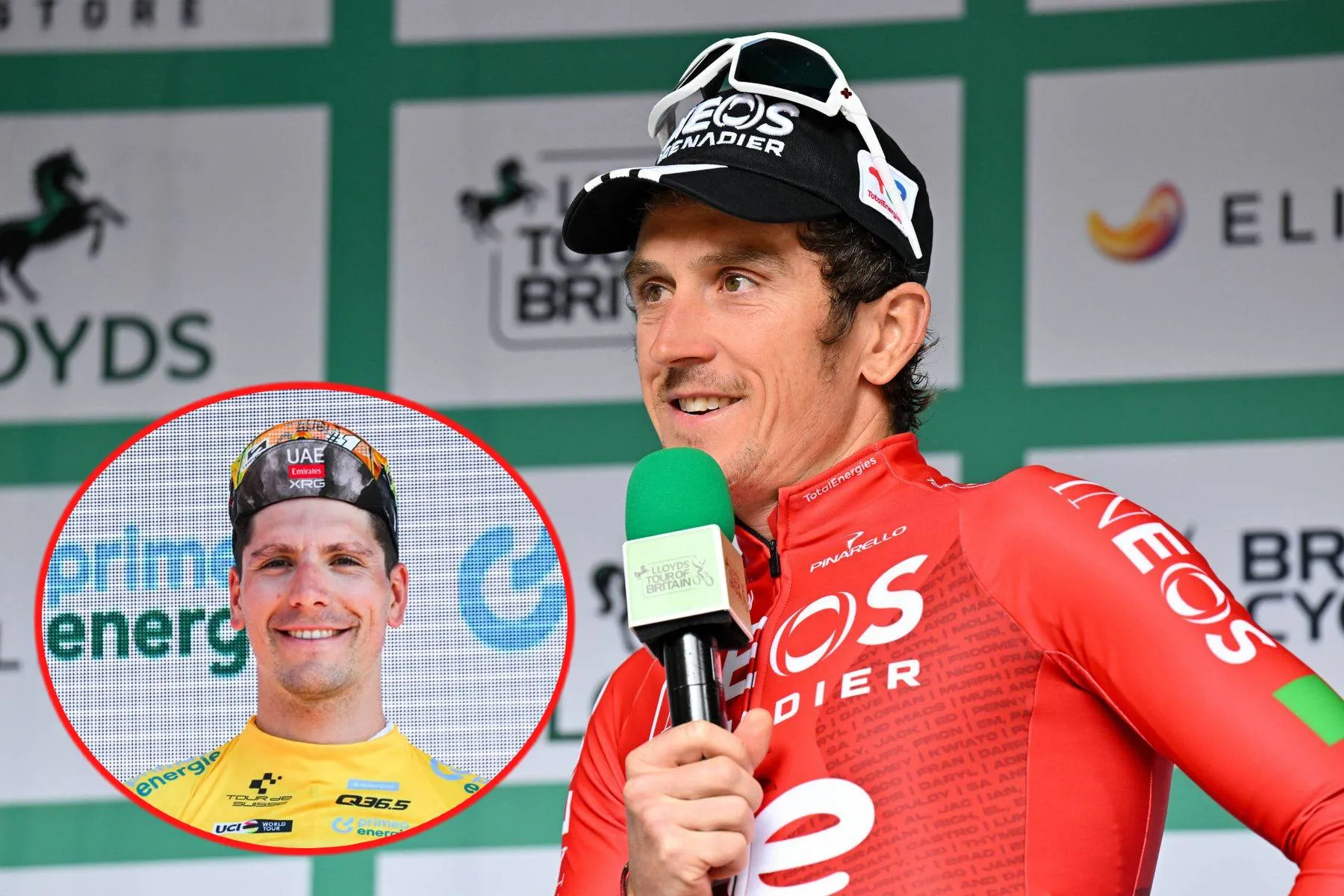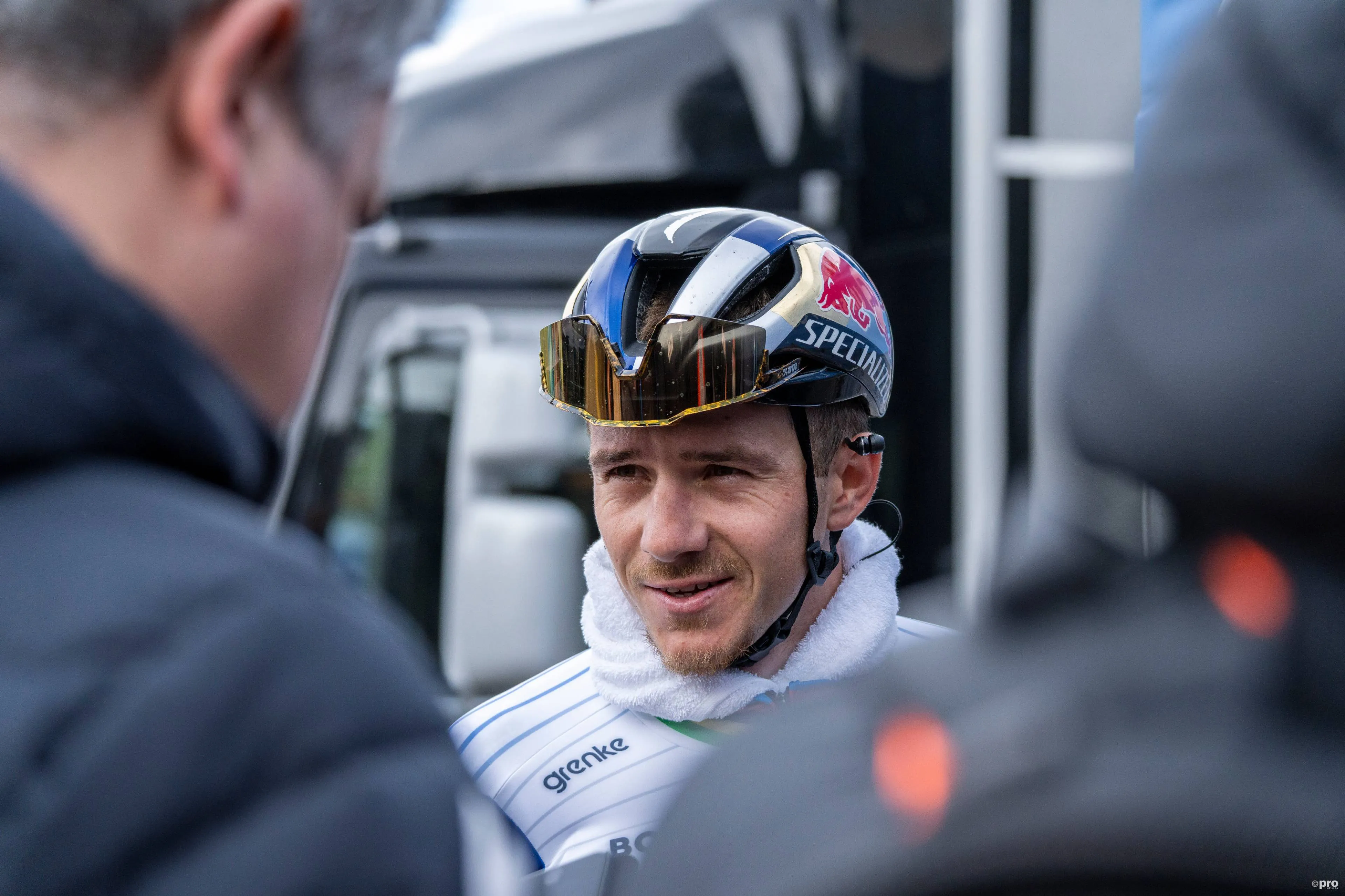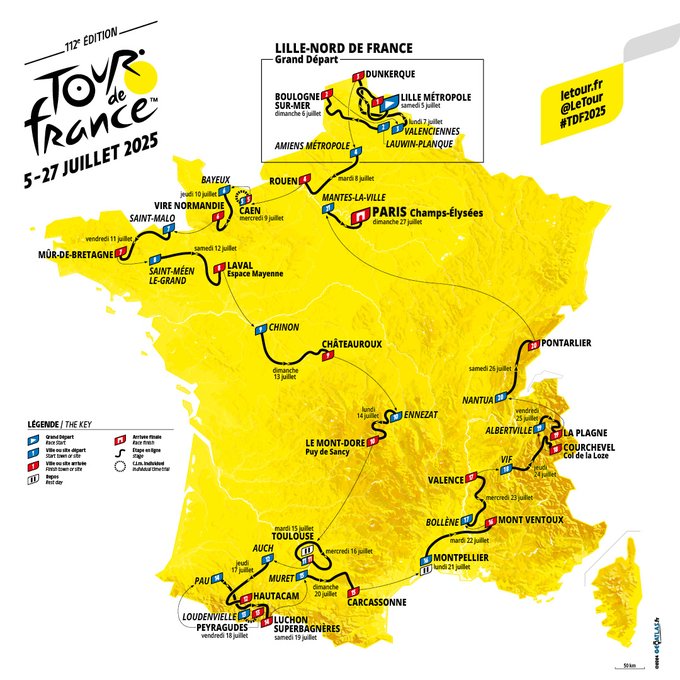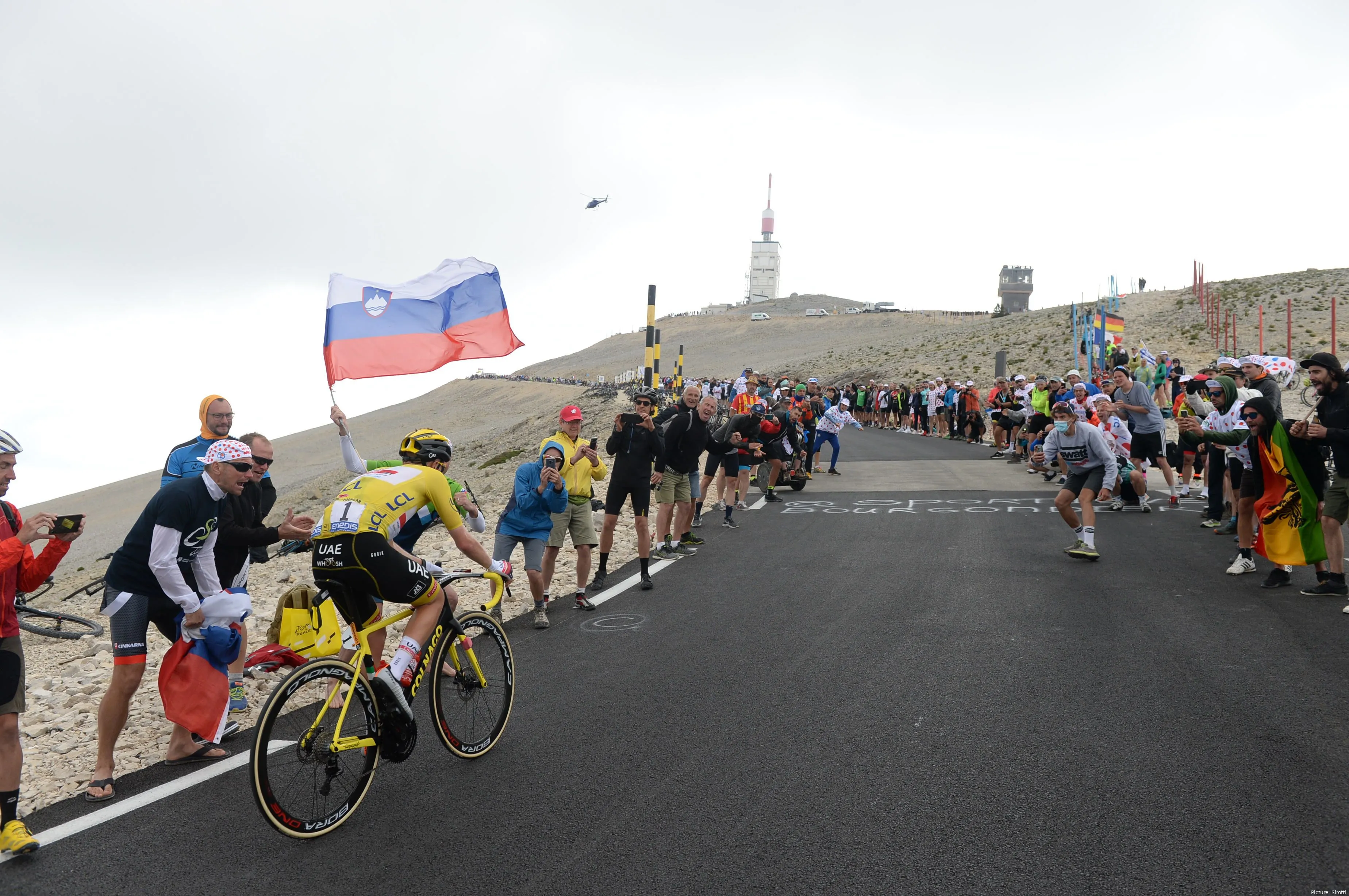
The 2025 Tour de France route has been officially revealed. It is a route that is quite different from past years, focusing a lot less on the climbs in the opening week of the race. However, the race will be decided on a few days where the mountains will make major differences and here we take a look at which could be the most decisive moments of the Grand Boucle.
The race will feature hilltop finishes in Boulogne-sur-Mer, Mur-de-Bretagne and Puy Sancy in the first week but the first high mountain stage will only take place in the Pyrenees and already within the second week of the race - an unusual start when comparing to recent editions. There are six high mountain stages (including a mountain time-trial) and these are the five most important climbs of the race:
Read also
Stage 12 - Hautacam
The race will enter the high mountains for the first time only on stage 12. Although the climbers will find tests in the first week, mostly in the form of the Mur-de-Bretagne and the Puy de Sancy stage, the long and constant efforts up the mountains only start on the 12th day of racing with a climb that has gained it's reputation over the decades in the race.
It's not the hardest mountain stage, but it is the first big one and there will be no room to hide possible fragilities or non-perfect form. It will be a day of revelations and the lack of a ton of mountains means we should see some 'watt bombs' being dropped on it's slopes.
After climbing the Col du Soulur and Col des Bordères, the riders will tackle Hautacam which is 13.6 kilometers long at 7.8%. It was most recently used at the 2022 Tour de France where Jonas Vingegaard, in the yellow jersey, managed to win the stage and win over a minute on Tadej Pogacar in what was the final day in the mountains. Without a doubt a day that can see a lot of damage.
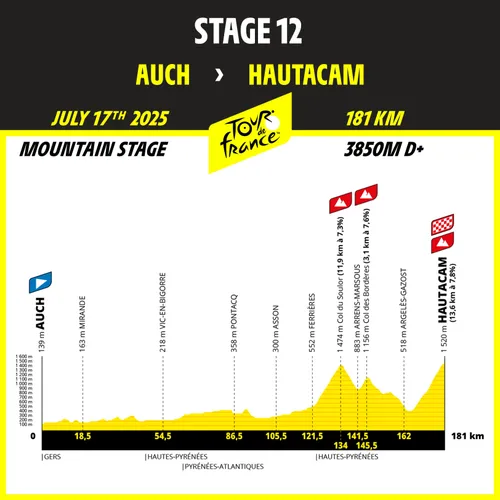
Stage 13 - Peyragudes
The second of three consecutive days in the Pyrenees is a mountain time-trial, a rare effort now in professional cycling, but one which sees a grand return. Without the endurance aspect, we may see surprising performances on this day.
But above all, big differences can be created taking into consideration that there will be no-one pacing and no teammates to dictate the rhythm. It's all about the legs and ability to suffer by yourself up the mountain. It's not the most difficult of challenges, but the climb to Peyragudes (8 kilometers at 7.9%) will be full of crowd and can certainly make key changes in the overall classification.
Furthermore, the average gradients hides the ultra-steep ramp up to the Altiport where the finish line is located. In 2017, yellow jersey Chris Froome cracked and lost 22 seconds to Romain Bardet in the final few hundred meters alone, which means that pacing strategy will be very important on the day for the stage win and overall classification.
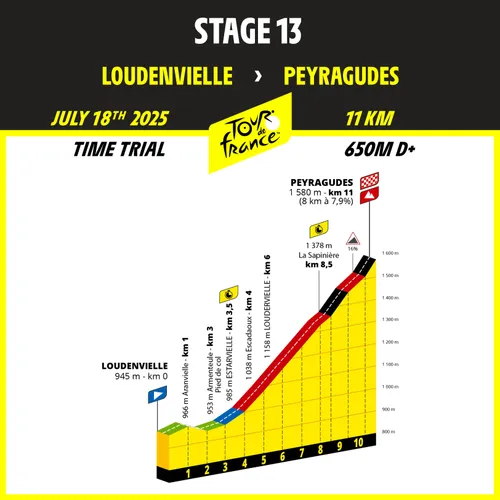
Stage 16 - Mont Ventoux
The return of the 'Geant de Provence'. Stage 16 will be the first day of the final week of the race and an off-day can spell disaster for any rider. Between the Massif Central and the Alps lays this monster ascent which will be the highlight of the day.
The final 15.7 kilometers are at an 8.8% gradient and this is an ascent that features almost no turns and switchbacks, is very steep from the start and is often exposed to the wind and weather conditions. It's a mountain for the pure climbers where often the attacks come early on.
In 2021, the most recent ascent of the 'bald mountain' at the Tour, Jonas Vingegaard attacked to win over a minute on the yellow jersey Tadej Pogacar. A lot can happen on this day, regardless of what comes before.
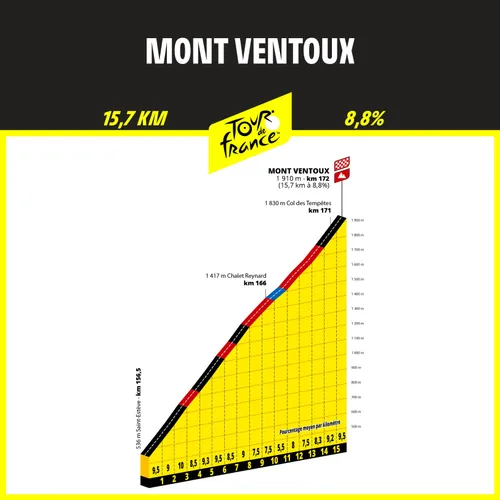
Stage 18 - Col de la Loze
There is an important note on this day which is that the Col de la Loze will not be tackled via the side the riders did in 2020 and 2023. The mountain gained a lot of notoriety in recent years over it's inhumane ramps in the final kilometers, but they will be avoided this time around.
Nevertheless this is the toughest day of the race and features 5500 meters of climbing and also the highest point - coinciding with the finish line. After climbing two monsters in the Col du Glandon and Col de la Madeleine, the riders make their way up to Courchevel for the final climb.
It will be 26 kilometers long at 6.5%, consistent at the start but still rather inconsistent towards the top - at high altitude. It's an hour-long effort even for the best riders in the race and can see many explode. The fatigue from three weeks of racing could spell the end of those who feel the fatigue.
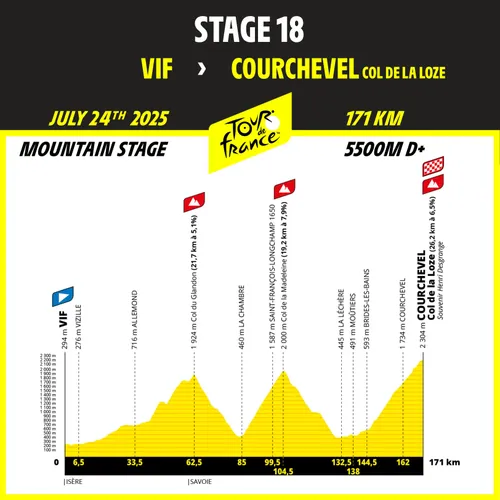
Stage 19 - La Plagne
The final mountain stage of the race goes up to La Plagne. Stage 19 features five categorized climbs and one of them is the Col du Pré, as well as the very fast descent of the Cormet du Roseland. All will culminate in the 19-kilometer long climb that hasn't been featured in the race since the year 2002 when the defending champion Tadej Pogacar was only a child.
He and all the top climbers will need to ascend the gruesome Alpine mountain which averages a constant 7%, and this is a test that all GC riders will have to pass with their best form, otherwise they risk losing minutes on it's slopes.

claps 5visitors 5
Just in
Popular news
Latest comments
- You need to get out moreJezla18-02-2026
- Ego and self regard are at the center of most human folly.TheOlderIGetTheFasterIWas18-02-2026
- You can't win 'em all. These early season races at this level are good because it shows where you are weak and need work.awp18-02-2026
- This is what I wrote 12-02-2026 10:00: "As far as I'm convinced, Remco still has "zero" wins. I invite Remco to stop in Siena to meet his Slovenian master, Pogi the G.O.A.T... but no, it's better to run away and hide. His fans will somehow defend and glorify him. Let me repeat, he still has zero wins in 2026. If someone doesn't have a high enough IQ to understand what I'm talking about, it's because they don't recognize the low ranking F category races. If Remco will beat Del Toro and Adam Yates in the UAE Tour, then I will consider this to be his first win in 2026. Ad acta." PS: Remco still has zero wins. His second and third class races don't count. The first real race comes along and Mustafa Remco fails.Mou-Cro-HR18-02-2026
- This is what I wrote 12-02-2026 10:00: "As far as I'm convinced, Remco still has "zero" wins. I invite Remco to stop in Siena to meet his Slovenian master, Pogi the G.O.A.T... but no, it's better to run away and hide. His fans will somehow defend and glorify him. Let me repeat, he still has zero wins in 2026. If someone doesn't have a high enough IQ to understand what I'm talking about, it's because they don't recognize the low ranking F category races. If Remco will beat Del Toro and Adam Yates in the UAE Tour, then I will consider this to be his first win in 2026. Ad acta." PS: Remco still has zero wins. His second and third class races don't count. The first real race comes along and Mustafa fails.Mou-Cro-HR18-02-2026
- OK, let's stop with the BS. Remco Mustafa didn't have any cramps, 100%. The only truth is, Remco is not the great cyclist that the Belgians and his fans want us to think. Ad acta!!!... Once in the fall of 2025 I said that Remco's chances of following Pogi are equal to my chances, there is no difference. The only difference is that I'm in front of a TV and Mustafa is acting and making excuses live in front of an audience of millions. Ayuso and Remco are the biggest liars in the peleton.Mou-Cro-HR18-02-2026
- I just hope that he just says that he got cramps and that's it, rather than some long-winded excuse which makes him seem even more of a piece of...
 Rafionain-Glas18-02-2026
Rafionain-Glas18-02-2026 - finally, a team that does something smart. I could never understand why Ineos would like Egan train as he did alone. put a motorbike behind him with an earpiece to call out issues above. same with remco crashing into a postal truck.mij18-02-2026
- Wow, that is not a good sign for Remco. Great win for Tiberi!Pedalmasher18-02-2026
- Great champion Remco but his profile is more suitable for Ardennes-like races and tour with no very hard climbs. Not only Tadej and Vingegaard, there are a lot of younger cyclists (del Toro, Ayuso, maybe Seixas, Nordhagen and others) that will soon be big GC boys.
 maria2024202418-02-2026
maria2024202418-02-2026
Loading
Write a comment

